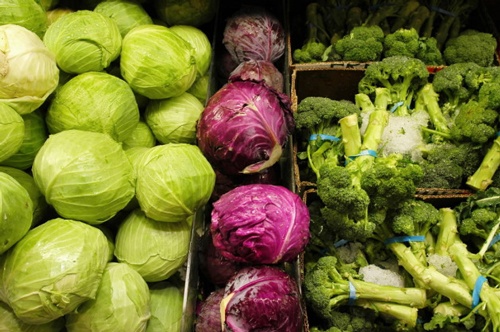
Cruciferous Vegetables Proven to Prevent Cancer
Posted by SoundHealth on Thursday, January, 29 2009 and filed under Nutrition
Key topics: Cancer • Breast Cancer • Cruciferous

Research is continually showing the benefits of eating a diet high in cruciferous vegetables such as broccoli, cauliflower and Brussels sprouts. These vegetables have been proven to prevent all sorts of cancer, including breast cancer.
Much of the evidence about cruciferous vegetables and their protective effects against different types of cancer focuses on the unusual phytochemical known as glucosinolates; in particular on the hydrolysis products, the isothiocyanates. These compounds are found in cruciferous vegetables and studies have shown that they:
- Detoxify by upregulating detoxification enzymes
- Prevent oxidative cell and DNA damage
- Are chemoprotective against numerous types of cancer
A recent study from UC Santa Barbara has shown why these isothiocyanates are so effective at inhibiting breast cancer cells [1]. Olga Azarenko, one of the research students on the team said,
"These vegetables contain compounds called isothiocyanates which we believe to be responsible for the cancer-preventive and anti-carcinogenic activities in these vegetables. Broccoli and broccoli sprouts have the highest amount of the isothiocyanates.
"Our paper focuses on the anti-cancer activity of one of these compounds, called sulforaphane, or SFN,
"It has already been shown to reduce the incidence and rate of chemically induced mammary tumors in animals. It inhibits the growth of cultured human breast cancer cells, leading to cell death."
Breast cancer is currently the second leading cause of cancer deaths in women.
Previous studies have shown that cruciferous vegetables prevent all sorts of cancer. One study of 1000 men revealed that men who consumed 3 or more servings of cruciferous vegetables per week had a 41 percent reduced risk of prostate cancer compared to those that consumed only one or less a week. [2]
Other studies have revealed how this compound works to provide chemoprotective effects against cancer on a genetic level by activating some genes that fight cancer and switch off others that fuel tumors.
Examples of cruciferous vegetables include:
- broccoli
- cabbage
- cauliflower
- kale
- Brussels sprouts
- watercress
- oriental cabbage
- radish
- wassabi
- various mustards
References
- [1] Azarenko O et al Suppression of microtubule dynamic instability and turnover in MCF7 breast cancer cells by sulforaphane. Carcinogenesis December 2008; 29(12):2360-8.
- [2] Cohen JH, et al. Fruit and Vegetable Intakes and prostate cancer Risk. Journal of National cancer Institute. 2000;92(1):61-68.
- Hecht SS Chemoprevention of cancer by Isothiocyanates, Modifiers of Carcinogen metabolism Journal of nutrition. 1999;129:768-774.
- Talalay P, Fahay JW. Phytochemicals from cruciferous Plants Protect against cancer by Modulating Carcinogen metabolism Journal of nutrition. 131:3027S-3033S, 2001.
- Donaldson MS. Nutrition and cancer: A review of the evidence for an anti-cancer diet. Nutrition Journal 3:19, 2004.
Health, fitness and longevity
Based upon the principles of health
in the Qur'an and Prophetic Traditions.
HealthyMuslim.Com
There are two bounties in which
most people lose out: good health
and free time. Al-Bukhari.